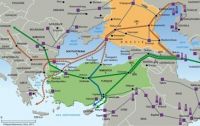Energy and electricity policy, planning and regulation in South Africa has been slow and bureaucratic, lacking visionary leadership, and marred by uncertainty. Policy positions and actions taken have tended to be reactive, and driven more by crisis management than by forward-looking leadership...

Geopolitics of fossil fuels

The Geopolitics of fossil fuels research axis whithin Ifri's Center for Energy and Climate deals with global geopolitical trends of the oil, gas and coal sectors, with a focus on short and longer term trends in demand and supply.
Director of Ifri’s Center for Energy & Climate
...Senior Advisor, Center for Energy & Climate
...Associate Research Fellow, Sub-Saharan Africa Center / Center for Energy and Climate
...Associate Research Fellow, Center for Energy & Climate
...China’s economy has rebounded since April 2020 and China is one of the few countries in the world that is expected to avoid a recession in 2020. With low imported gas prices, progress with the gas market liberalization and success in pushing up shale gas production, the window of a golden age...
Turkish President Recep Tayyip Erdogan announced Turkey’s biggest gas discovery ever on August 21, 2020. Initial findings show that the estimated reserve capacity is 320 billion cubic meters (bcm) of gas.
Japan has been steadfastly promoting the development of its hydrogen economy at all levels: political, diplomatic, economic and industrial. It is yet to be seen if this excitement can be turned into a credible, cost-effective and large scale deployment.
The European Union (EU) is committed to reach climate neutrality by 2050. Similarly, Norway aims to create a zero-emission society by that same year.
The vast gas discoveries in Mozambique, some 160 trillion cubic feet (4,530 billion cubic meters), will make this very poor country (6th lowest gross national income (GNI) per capita – the lowest in Africa) one of the world’s future major producers of liquefied natural gas (LNG) within two...
South Korea is a hydrogen (H2) frontrunner. The world’s first commercial fuel cell electric vehicle (FCEV) was launched by the South Korean car manufacturer Hyundai (Tucson i×35) in 2013.
...East Africa has the potential to experience a gas and liquefied natural gas (LNG) export boom in the coming years due to several projects that have been released.
China’s 2018 energy consumption data capture the ambiguity of Beijing’s attitude toward climate change. Energy demand rose by 3.5% to 3,155 million tonnes of oil equivalent (Mtoe), with an increase of coal consumption (though its share in the overall energy mix is decreasing) and an expected...
China’s gas industry has been moving into a new era. China’s natural gas demand has skyrocketed amid a state campaign that encourages coal-to-gas switching. In just two years, China added 75 billion cubic meters (bcm) to global gas demand, the equivalent of the UK gas market, the second...
Falling Oil Prices: a stress test for the US Shale Oil and the Global Market Ifri Energy Breakfast Roundtable
The wide development of the US oil production these last few years has undoubtedly brought major changes on the oil market, reducing significantly the US imports of crude oil, increasing the American exports of petroleum products and changing more globally the trade flows....
The Chinese Gas Strategy: Challenges and Policy Responses
China is facing a significant increase of its energy demand and has to deal with the critical issue of air pollution in its main cities. In this context, natural gas is becoming a key priority. Gas imports may triple by 2020 and China needs to secure and diversify its...
Iran's Oil and Gas: Back on the Market Soon?
Seminar of the Center for Energy with Jean-Pierre Favennec, Professor, IFP Énergies nouvelles, Consultant, WD Cooperation and Fair Links, David Ramin Jalilvand, Research Fellow, Center for Caspian Region Studies, Freïe...
Shipped or piped: can shale gas secure EU supplies ?
Following the publication of a study about “Shale Gas in Poland, United Kingdom, Danmark: Toward an European Model?” conducted by Sylvie Cornot-Gandolphe, Ifri Center for Energy organizes a roundtable conference with: Sylvie Cornot-Gandolphe, Associate Research Fellow...
Présentation du World Energy Outlook de l'AIE- Contexte énergétique mondial et transition énergétique nationale
L'AIE vient de publier l'édition 2013 de son rapport Energy "World Energy Outook" (WEO) qui analyse les perspectives énergétiques mondiales d'ici 2035. Quel impact sur la compétitivité des grandes régions du monde ? Où en sont les marchés pétroliers ? Comment donner corps aux politiques d...
Shale Gas Boom in the US: What future for European Petrochemical Industries?
Following the publication of a study about “the impact of shale gas development in the US on the European petrochemical industry” conducted by Sylvie Cornot-Gandolphe, IFRI Center for Energy organizes a roundtable conference with:
...
Hydrocarbons in Algeria, long-term or uncertain supplier for EU?
As part as the Ifri Energy Breakfast Roundtable series, a seminar with :
...
Turkey's energy strategy under pressure : domestic bets and regional constraints
Ifri"s Contemporary Turkey Programme and Ifri"s Center for Energy organize a joined seminar with Dorothée Schmid, Research Fellow, Head of the Contemporary Turkey Programme at Ifri, Mithat Rende, Ambassador, Director General for Multilateral Economic Affairs,...
New Energy Resources in East Africa: Pushing back the continent's last hydrocarbon frontier
As part as the Ifri Energy Breakfast Roundatable series, and in collaboration with the Africa Program at Ifri, a seminar with Benjamin Augé, Associate Fellow, Ifri, Roger M. Carvalho, Chief Executive Officer, Corporate Finance, SPTEC Advisory, and
Status and Outlook for Shale Gas and Tight Oil Development in the US
Conference avec Adam Sieminski, Administrator of the US Energy Information Administration, chaired by Cécile Maisonneuve, Director of the Ifri Center for Energy.
The conference will be held in English





















